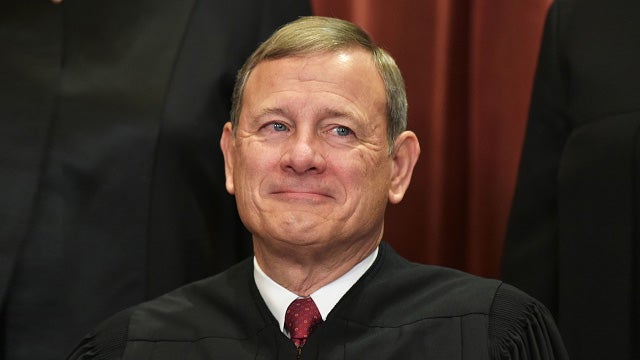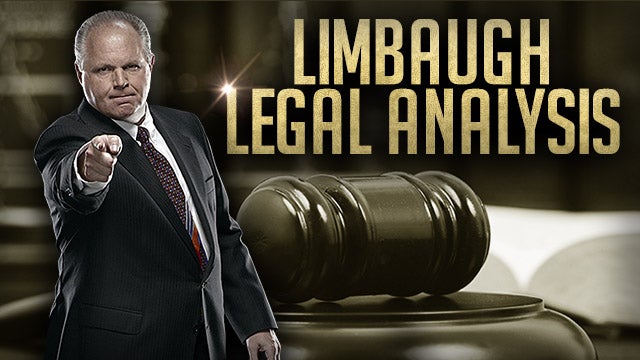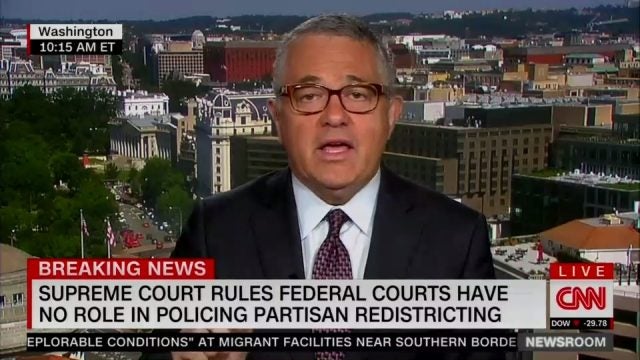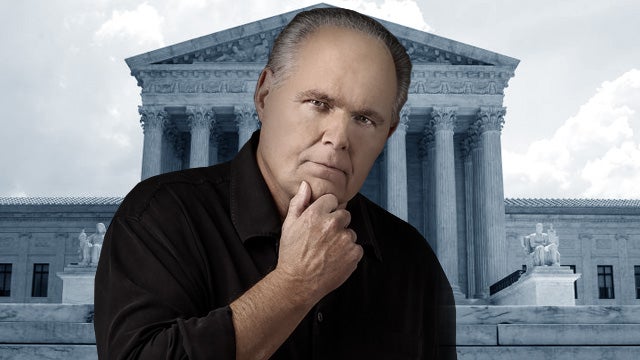RUSH: We have a couple Supreme Court decisions today that, when you dig into them, the Democrats and the media are unhappy about both of them, even the census question, despite the fact that the Chief Never Trumper, the chief justice, John Roberts, takes every occasion he can to rule against the interests of Donald Trump, the census question is actually not as dire as the original take on it was.

The gerrymandering question, the Democrats and the media are fit to be tied. They’re beside themselves. They can’t believe it. The deck is gonna remain stacked against them. The Republicans are gonna continue to be able to draw districts. And you know why? Because that happens at the state level and Republicans control the majority of the governorships and state legislatures, because why? Because they won elections!
If you listen to the Drive-By Media today, that’s not fair.
It’s not fair that the Republicans get to draw these districts. Well, it is fair because that’s part of what happens when you win. Elections have consequences. They wouldn’t have been concerned at all, if the situation were reversed and we had the same Supreme Court ruling, if the Democrats had a majority of state legislatures, they would have been applauding it today. I’m talking about the media, the supposedly impartial journalist community.
BREAK TRANSCRIPT
RUSH: On now to the two Supreme Court decisions that we got this morning. The first one was a nine to nothing, unanimous decision not to permit the question of citizenship on the 2020 census. Now, the ruling here gets quite into the weeds. And as is case, I myself have not had a chance to personally delve into it. Right now all I am is a prisoner of sorts to the people who have seen it and analyzed it, to date.
What I think has happened here is, on the surface, the Supreme Court — this results from a request from Wilbur Ross, the commerce secretary, runs the census, wants to put a question of citizenship. The Supreme Court said you haven’t given us enough of a reason why you want to do this. And the reasons you’ve given us, it looks like it’s politics, and we don’t do politics here, and you’ve got some evidence here that we haven’t seen.
The Supreme Court does not like to take cases that no other court has taken and ruled on. The Supreme Court, in their minds, is an appellate court. If you have a case where you are presenting evidence that hasn’t been presented before, the odds are they don’t want it. Exceptions to everything. This is nine to nothing.
Now, other people have looked at this, this just a temporary thing. It’s obvious if you read the decision that the question is going to end up on a census at some point. It may not make the 2020 census. There’s even some dispute over when the deadline has to be resolved. July 1st is one date. October is another. October, I guess, is still possible.
The other case is the gerrymandering or gerry, depending on how you choose to pronounce it. And this is where the winners of elections in the various states are in charge of drawing the various congressional districts within the states. And the Supreme Court said today this isn’t our gig. We don’t do politics and we don’t draw congressional districts. The states do this, and it’s based on election results, and this is not our purview.
The reason this case is up, the Democrats have been losing statewide elections. People have forgotten this, but in 2016 after Trump won, people need to remember that after that election — obviously this changed, 2018 midterms. But in terms of electoral seats held federally in the states and in local communities, Democrats had never held fewer electoral seats since the early 1900s after the 2016 election.

I remember James Carville all over TV lamenting how relegated to obscurity the Democrats had been. It was a shock because they all thought Hillary was going to win in a landslide. They hadn’t had this little power. And it was largely not because of the makeup of Congress. It was because the Republicans controlled the vast majority of states, state legislatures and governorships.
And when you got even more local into various cities, the Republicans were making gains left and right. And there are consequences to winning those elections. States, congressional districts are drawn by the legislatures of those states. And if the Republicans control the legislature, they’re gonna draw the lines.
Now, the losers can go to court, do all kinds of things to try to stop the majority from doing this, but it’s a huge advantage. And since the Democrats are on the short end of the stick, they wanted this changed. And the Supreme Court basically said this is not our job. We don’t get into local politics like this.
North Carolina is a good example. North Carolina today, people there are relieved that the Supreme Court ruled that lower courts, including federal and state courts, have to stay out of this kind of politics. And that really is an important ruling, because the courts for the most part have been attempting to usurp as much power as they can, all three branches of government, it’s a natural thing.
Legislative branch wants more power away from the executive. The executive doesn’t want Congress to have any power. And the judicial branch of late has positioned itself to sit in judgment over what’s legal and illegal, what’s constitutional and unconstitutional. And when you talk about liberal judges, they have been taking as much power as they can get using the power of the robe to actually write law. That’s what’s remarkable here.
The Supreme Court rejected the opportunity and also ruled that lower federal courts and state courts have to stay out of this. And their decision was clear. The U.S. Constitution is the law of the land. And that means that the Supreme Court has no jurisdiction or authority to make decisions on partisan gerrymandering. Supreme Court doesn’t. The lower federal courts don’t. But state courts have been involved in it.
Now, what it was prior to today’s ruling was politics through the judicial system. Federal judges have no license to reallocate political power between the two political parties. Federal judges have no license to reallocate political power between the two major political parties with no plausible grant of authority in the Constitution. It’s not there. No legal standards to limit and direct their decisions. Federal judges simply don’t have this power. Supreme Court ruling today.
Chief Justice John Roberts wrote that those asking the top court to block gerrymandered districts effectively sought “an unprecedented expansion of judicial power.” And they did. It’s exactly what they wanted. It’s exactly what the Democrats wanted. They wanted the Supreme Court to come in and start telling states that they had no charge over this, they had no control over it, didn’t matter who won elections, that they couldn’t do it.
And Roberts shot it down. And there are a lot of people shocked by this. You know why? Because this was clear. The Supreme Court followed the Constitution to the letter. There was no doubt about it, no ifs, ands, buts. There was no attempt by the Supreme Court here to usurp any power that the Constitution doesn’t grant them. That is rare today! It is rare for any court to openly reject the opportunity to use and acquire more power.
And the Supreme Court today said, “You don’t have a right to do it. We don’t have a right to do it. It’s lower federal courts and state courts.” Now, liberal states like Maryland, they can draw the lines as they want. Conservative states, Republican states like North Carolina can draw them as they want. This is how it was intended. This is federalism to the T. And you can tell that this decision is correct by watching the panic or listening to it on the Drive-By Media.
So just a couple of sound bites here to illustrate. Jeffrey Toobin. He’s a good barometer. He’s the CNN legal beagle. And he’s a good barometer for how the rest of the left and the Drive-By Media’s gonna react to things. And he is in crisis on the gerrymandering decision, calling it a huge victory for the Republican Party. Audio sound bite number one.
TOOBIN: Huge victory for the Republican Party here because it’s the Republicans who control most of these states, who control Ohio, who control Florida, who will be redistricting following the 2020 census. And now this is a green light to jam all the Democrats into a handful of districts and put the Republicans in control of all of the rest of them.

RUSH: Yeah. Now, I forget who it was. I’m watching the panic in the Drive-By Media today on this, and it was somebody on CNN. And they were so worried. “Oh, my God. This is the worst thing that could have happened because this is just gonna make America more partisan than ever, and this is stripping away so much power and influence from moderates. It used to be that moderates had a say-so in congressional districts to modify and moderate some of the extreme –”
But now they don’t. The Republicans can draw the districts they want and put the Democrats where they want them in the states they control. The dirty little secret: The Democrats been the same thing for all these years in the states they win. They have been drawing districts that look like overcooked spaghetti. Some of the strangest looking congressional districts in order to guarantee a Democrat victory.
Democrats have done this in states they have controlled for decades. There’s nothing new here other than the court refusing to accept the power to go in and tell states how they have to do things. And Democrats are used to courts saving them when they lose elections, hence the panic today.
BREAK TRANSCRIPT
RUSH: Our next audio sound bite is audio sound bite number 2. This is Jeffrey Toobin, and he’s not as exuberant over the Supreme Court turning down the administration’s request for a question on citizenship in the next census.
TOOBIN: I’ve now read the opinion, which helps.
WOMAN: Great!
TOOBIN: Or at least I’ve read, uhhh, enough to understand what it is. If you read all the… If you look at the full context, it certainly looks like — to me, anyway — that the citizenship question at the end of the day is gonna wind up on this questionnaire. If you look at what the more conservative justices wrote — and there are five of them on the court — it looks like the question is going to wind up on the surveys. Now, it is also worth… Everything is controversial in this case, including the deadline. Because one version of the deadline is that it’s July 1st. But another version of the deadline is that it’s October.

RUSH: If it’s July 1st, there’s no way it can make the 2020 census. October is a different thing altogether. He’s talking about future rulings on this. The court didn’t take this because there is the equivalent of evidence that they haven’t previously ruled on. They look at themselves as an appellate court. They don’t like… After they rule, there’s nowhere to go. So they generally don’t take cases with new evidence. But that’s not what this is about. If you were to take… You know, I have often suggested that you take these online courses that Hillsdale College.
They have a course that you can take free of charge, Rush4Hillsdale, on the Constitution. If you take that course, you will learn that by virtue of the founders’ intentions that every constitutional decision had to be based on a constitutional principle. So when I listen to reactions about the citizenship question, nobody gives you any reason that’s rooted in the Constitution. In other words, none of the justice — none of the opinions — cite the Constitution as a reason for not doing this. You know what the sole reason?
It might frighten illegals.
It might intimidate illegals.
It might…
They’re politicizing it! They’re not using the Constitution, or didn’t use the Constitution in deciding this case. They used, mostly, liberal emotion.
BREAK TRANSCRIPT
RUSH: Donald Trump’s not happy about the Supreme Court decision on the citizenship questionnaire, and he tweeted about it. He says, “Seems totally ridiculous that our government, and indeed Country, cannot ask a basic question of Citizenship in a very expensive, detailed and important Census, in this case for 2020. I have asked the lawyers if they can delay the Census, no matter how long, until the United States Supreme Court is given additional information from which it can make a final and decisive decision on this very critical matter.
“Can anyone really believe that as a great Country, we are not able the ask whether or not someone [living here] is a Citizen”? Is that not the essence of simple common sense? The real question here: Why do we have to have the Supreme Court say that we can do it or not? “Well, Rush, there’s issues of constitutionality.” They’re not deciding this on the Constitution! That’s the problem! Every constitutional decision must be solved or related to some constitutional principle. This isn’t.
This census question on whether or not somebody’s a citizen, the only reason people are talking about this is (sobbing), “It may make the illegals hide! It may make them uncomfortable. They may not come forward and want to be counted because it might make them think they’re going to be deported.” Oh, so we can’t find out who is and who isn’t a citizen because asking them might make them feel bad, and so we can’t scare the illegals? That’s the basis that the opponents on to the question are using, and there’s nothing constitutional about that.
Now we gotta go back to the Supreme Court, and their term is ending at the end of the week. So now we want to delay the census, and we’ve gotta ask the Supreme Court if we can do that. It was a nine-to-nothing decision. I’m telling you, the reason why this thing went the way it did is because the government, in making its case, presented evidence that nobody else has decided. The court’s an appellate court. They look at themselves as an appellate court. They don’t decide original cases, and since there hasn’t been any original decision on this at a lower court, they didn’t want to take it.


